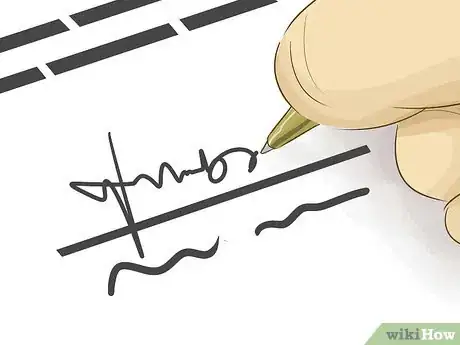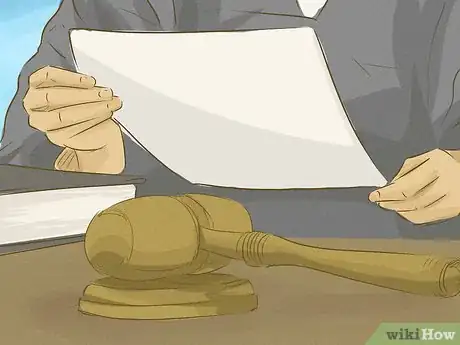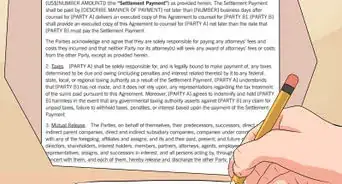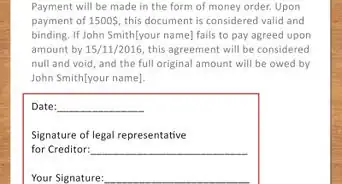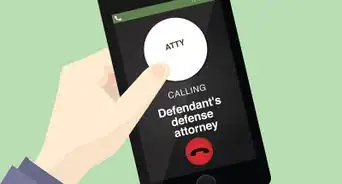This article was written by Jennifer Mueller, JD. Jennifer Mueller is an in-house legal expert at wikiHow. Jennifer reviews, fact-checks, and evaluates wikiHow's legal content to ensure thoroughness and accuracy. She received her JD from Indiana University Maurer School of Law in 2006.
There are 7 references cited in this article, which can be found at the bottom of the page.
This article has been viewed 34,592 times.
When you think of a civil lawsuit, you probably imagine scenes from a tense courtroom drama with clever and confrontational attorneys and at least one shocking revelation or emotional outburst on the stand. However, the reality in the United States is that most cases -- as many as 90 percent by some estimates -- settle before the judge ever bangs the gavel.[1] While accepting a settlement offer may sound like giving up, it actually gives you the opportunity to realize greater gains with much less risk.
Steps
Understanding Settlement Opportunities
-
1Pay attention to timing. A settlement offer may be made at any point during a civil lawsuit or administrative proceeding. The other side can even make a settlement offer after the trial has begun.
- A settlement offer during trial might mean that the other side thinks it’s going to lose and wants a more predictable way out of the situation. This is especially true if you’re involved in a jury trial.[2]
- A settlement offer early on in the proceedings, such as right after you’ve filed your petition, probably indicates a desire to get rid of the situation as quickly as possible.
- Settling a case early allows for a quick resolution but might mean you get less out of the deal than you would if you knew more about the issue at hand.
- Sometimes a company offers an early settlement because it doesn’t want to disclose sensitive information or trade secrets, or because it fears other parties will file similar suits.
-
2Use a settlement to avoid risk. Whether you’re a plaintiff suing someone else or a defendant who’s been sued, a settlement provides the same opportunity to avoid the financial and emotional costs of litigation and create certainty in the outcome.[3]
- For a plaintiff, accepting a settlement offer may mean taking less money than the maximum you could have received if you’d gone to trial. However, you can never be certain about whether you’d receive everything you asked for at trial, whereas you can be sure of a settlement amount.
- For a defendant, offering or accepting a settlement may mean paying more than you would have if you’d gone to court and won. If you don’t like your chances of winning at trial, though, a settlement may begin to look more attractive.
Advertisement -
3Take the opportunity to get creative. A settlement offer allows you to craft terms that actually fit the nature of the issue and come closer to satisfying the needs of all involved.
- Since a settlement offer is essentially a contract between the parties, you can feel free to suggest -- and agree to -- terms that might not have been available if you tried your case in court.[4]
- For example, some settlement agreements require one party to make a formal apology to the other for the wrongs committed. In employment discrimination cases, the settlement might also include a neutral reference indicating the employee resigned for personal reasons.[5]
Evaluating Settlement Terms
-
1Consider whether you want a confidentiality clause. Many settlement agreements include a clause that forbids the parties from disclosing the settlement’s amount or terms to anyone else.
- Large corporations often want confidentiality clauses to maintain positive public relations and avoid exposure to copycat suits.
- Aggrieved plaintiffs may prefer an open settlement agreement because they want the public to know about a particular injustice. Allowing a settlement’s terms to be made public also allows attorneys to adequately ascertain the value of similar cases that may arise in the future.
- If there is disagreement about including a confidentiality clause in your settlement agreement, the total amount of the settlement may be adjusted to compensate for a compromise.
- For example, if you sue a chemical company and they want a confidentiality clause but you want the world to know of the company’s pollution practices, you might be willing to take less money if the confidentiality clause went away.
-
2Know your acceptable payout range. Whichever side of the table you’re on, make sure you know where your floor -- or ceiling -- is. Once you set the minimum you’re willing to accept -- or the most you’re willing to pay -- don’t budge from that number.[6]
- If you’re unsure how to value your case, consult an attorney with experience in that area of law and she can help you.
- Beyond dollar figures, assessing your priorities can help you arrive at an ideal settlement.
- For example, suppose you slip and fall at your local donut shop, dislocating your hip. The donut shop is willing to pay your medical bills and lost wages, but balks at paying damages you think you’re entitled to receive for your pain and suffering. However, the donut shop offers to provide you and your close family free donuts for life. Such an offer might sweeten the deal to the point that you’re willing to accept far less money than you would otherwise.
-
3Ensure terms don’t violate state or federal law. A number of contract terms are considered against public policy and illegal under state or federal law. At best, a judge would rule that term void; at worst, the inclusion of such a term could void the entire settlement.
- The best way to guarantee your settlement doesn’t include any terms that violate the law is to hire an attorney. Attorneys are bound by professional ethics rules and bar regulations to alert you to illegal terms and have them removed.
Accepting the Settlement Offer
-
1Draft the agreement. In many legal contexts, it’s standard practice for the defense attorney to draft the agreement. However, in some situations the plaintiff may draft it, particularly if the offer was initiated with the plaintiff.
- If both sides have attorneys, professional ethics rules dictate that all settlement offers must be communicated between attorneys, who then have an immediate duty to inform their respective clients.
- If you still don’t have an attorney at this stage, it’s highly recommended that you hire someone to at least look over the terms of the agreement and ensure it reflects your understanding and intent.
- Attorneys typically draft settlement agreements based on language from previous similar agreements and from reference to legal sources. Without an attorney’s assistance you may neglect to include key provisions.
-
2Carefully read terms. Whether your side or the other side drafts the settlement agreement, read it several times and make sure you understand everything in it.
- Consult an attorney if you haven’t already. The settlement agreement could affect your legal rights and obligations and may preclude you from taking further legal action on this case or similar ones that might arise in the future.
- Discussing the terms with someone who is familiar with civil litigation may significantly improve your chances of getting a favorable settlement.[7]
-
3Sign the agreement. Once you’re sure you understand the terms thoroughly, all parties must sign the agreement so it becomes legally binding.
- You may meet up with the other side and all sign the agreement at once, or you may sign it and send a copy via mail, email or fax. Regardless, all parties to the settlement must sign the same document.[8]
- If you are suing a corporation or an insurance company, an authorized representative will sign on behalf of the business entity. For example, if you have an insurance company involved in your workers’ compensation lawsuit, the settlement agreement may be signed by the claims adjuster assigned to your case.
-
4Make the exchange bargained for in the settlement agreement. Typically, this involves the plaintiff’s side showing proof the lawsuit was dismissed and the defendant’s side handing over a check for the full settlement amount.
-
5Inform the court or administrative agency where the cause of action was filed of the parties’ decision to settle. In many legal contexts such as class actions or workers’ compensation lawsuits, state or federal law requires court approval of any settlement made by the parties. In these situations, the settlement is not legally binding until approved.
- If you’re not sure whether your settlement requires judicial approval, consult a licensed attorney experienced in that area of law.
- If court approval is required, an attorney can make sure all the correct language is in place to get your settlement over this last hurdle.
References
- ↑ http://www.nytimes.com/2008/08/08/business/08law.html?_r=0
- ↑ http://legal-dictionary.thefreedictionary.com/settlement
- ↑ http://legal-dictionary.thefreedictionary.com/settlement
- ↑ http://blogs.findlaw.com/free_enterprise/2014/04/7-lawsuit-settlement-tips-for-business-owners.html
- ↑ http://www.eeoc.gov/federal/adr/fsms-settlement.cfm
- ↑ http://blogs.findlaw.com/free_enterprise/2014/04/7-lawsuit-settlement-tips-for-business-owners.html
- ↑ http://www.nolo.com/legal-encyclopedia/free-books/small-claims-book/chapter6-5.html
- ↑ https://www.law.cornell.edu/cfr/text/32/536.63








